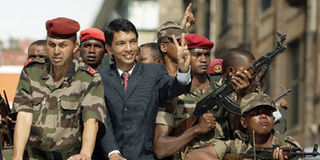After 50 years of independence, 17 African states take stock

Madagascar’s coup leader Andry Rajoelina greets his supporters after making his way into the presidential palace in this March 17, 2009 photo. Analysts say that despite problems, country better off under self rule. Photo/REUTERS
DAKAR, Tuesday
Fifty years after independence 17 African states face sober introspection as they take stock of failures and success, assessing post-colonial mistakes while taking pride in national identity.
The Year of Africa in 1960 saw independence sweep across west and equatorial Africa, including 14 French colonies, but half a century later the initial joy of freedom has given way in many to civil war, poverty and political instability.
Born on the eve of independence, Abidjan journalist Venance Konan feels that to celebrate Cote d’Ivoire’s independence with pomp is “a hell of a nerve” while people live in “poverty, in a country controlled by a rebellion in the north.”
“Africans must take time ... to recognise where they have failed,” he said, noting that, in general, “people (were) freed from the yoke of colonialism only to fall under other yokes: one-party states, military powers, dictatorial powers.”
After Ghana became the first sub-saharan African state to be granted independence in 1957, a surge of anti-colonial nationalism saw many countries quickly follow suit.
“There were very strong advances in the sixties, a strong deceleration in the 25 years that followed, and today, a movement forward,” said Democratic Republic of Congo historian Elikya Mbokolo.
According to Mr Mbokolo, “emerging states” currently outnumber “those which pose problems”.
The nations celebrating independence this year range from politically stable Cameroon, Senegal and Mali to the DR Congo, where one of the world’s deadliest wars raged between 1998 and 2003 and sporadic fighting still wracks the east, and war-torn Somalia.
Some recall certain aspects of the colonial era with nostalgia, such as Ivorian Germaine Kouassi, 67, a retired civil servant who remembers that before 1960, “school was really free, we were given a pen-holder, a quill, all the supplies.”
But most arguments on the positive aspects of colonisation are quickly shot down. Mr Mbokolo said that colonial rule “was based on blatant racism” and “frenzied economic exploitation.”
“Colonisation was a rape. To open such a debate is unhealthy because that amounts to saying ‘OK, we were violated, but it resulted in a pregnancy and then a beautiful baby,’” said Guy Rossatanga-Rignault, law professor at the Omar Bongo University in Libreville.
“Africa never asked to be ‘civilised’ and no-one can pre-judge what it would have become without colonisation,” he said.
Some await a “symbolic trial” of France, which remained heavily involved in Africa after 1960 to maintain its own interests.
Cameroon’s Paulin Tchuenbou, co-ordinator of a human rights organisation, charges that Paris supported a state where men were “more concerned with safeguarding their privileges and the interests of France than the well-being of Cameroonians.”
In the general view, the process of liberation which started in 1950 remains unfinished and African states still need take charge of the economy, energy and nutrition in their own countries.
However despite the nagging troubles in many of the countries, independence celebrations provide an opportunity for a celebration of identity.
“We have our own identity, we feel it clearly, we are Senegalese,” said Ibrahima Diallo, 24, from Dakar.
Historian Lucile Rabearimanana from Antananarivo - where a political crisis endures after a coup last year - said “there is pride in being Madagascan. Even if some stir up tribalism (between people of the coast and those from the high plateaux), there is a general sense of being one nation.”
“The culture is developing, there is an blooming Madagascan identity.”
Gabonese professor Rossatanga-Rignault urged African states to “take stock ... to project themselves positively in this rough world of ours, and create a place there.”
“This means breaking a certain number of mental bonds to exist in our own right as a part of the world and no longer always peripheral to it,” he concluded. (AFP)




